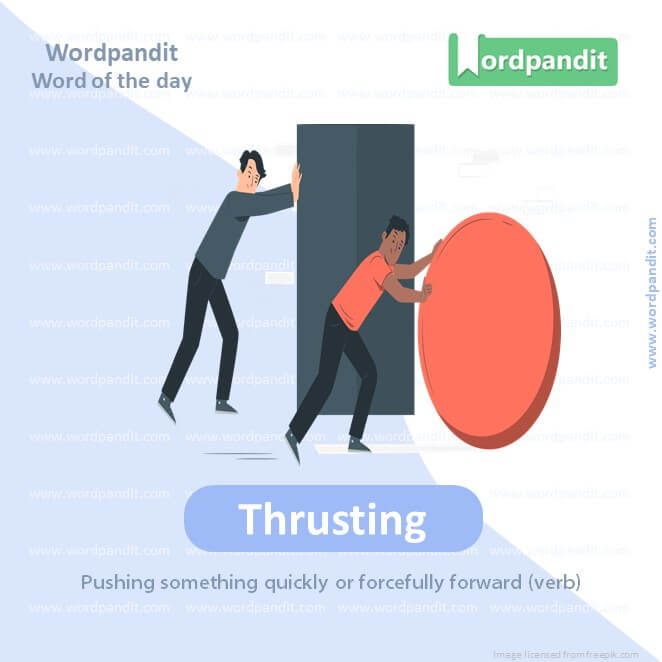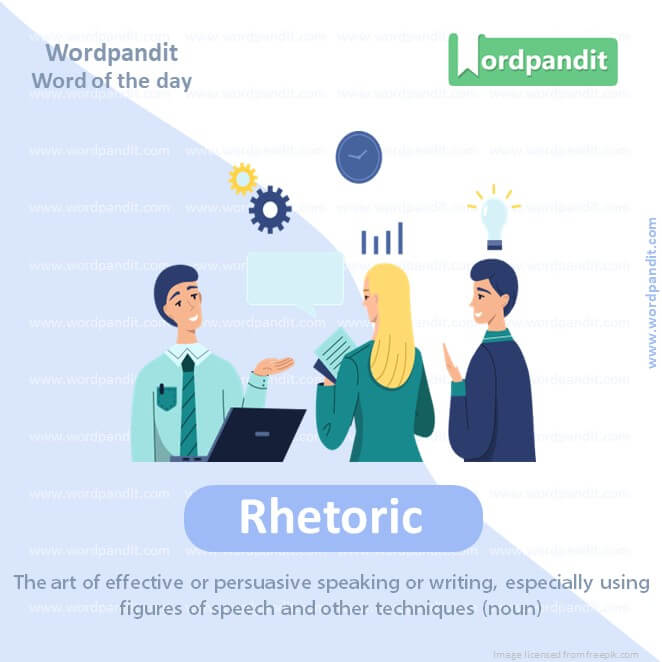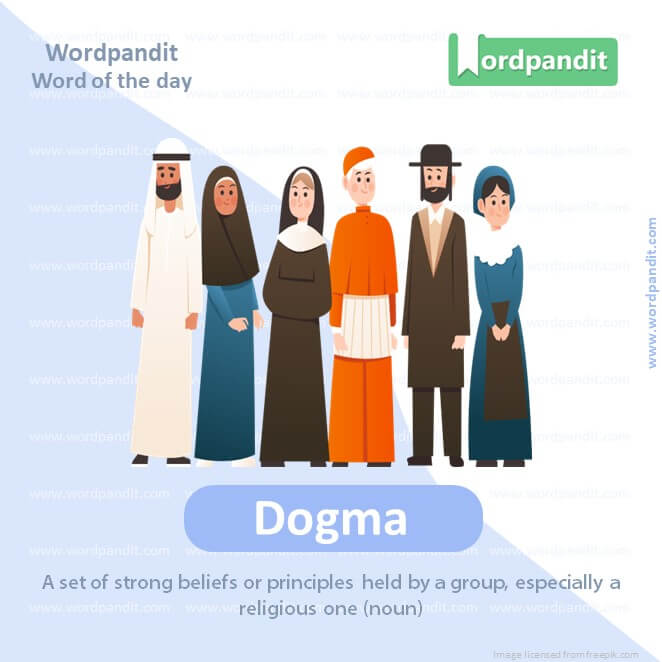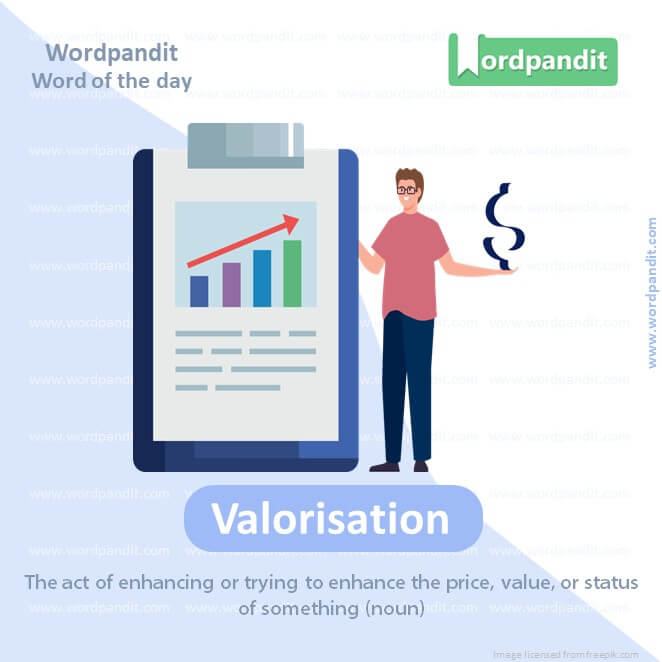Hi there. Welcome to this special section @ Wordpandit. Our endeavour here is straightforward: highlighting daily vocabulary words that you would come across in leading newspapers in the country. We have included the following newspapers in our selection:
• The Times of India
• The Economic Times
• Hindustan Times
• Mint
• Indian Express
We are putting in extensive work to develop your vocabulary. All you have to do is be regular with this section and check out this post daily. This is your repository of commonly used words; essentially, we are posting a list of daily used words. Hence, this has significant practical application as it teaches you words that are commonly used in leading publications mentioned above.
Visit the website daily to learn words from leading Indian newspapers.

WORD-1: Thrusting
CONTEXT: “After going through the nominal lift-off process, there was a hold issued by the ground computer, which is called the automatic launch sequence computer, that detected a non-conformance for allowing the engine to continue the thrusting to go further. This happened due to a monitoring anomaly in the system, which is why we could identify it very fast and correct it.”
SOURCE: Hindustan Times
EXPLANATORY PARAGRAPH: Imagine you’re playing with your toy sword, and you push it forward quickly, as if you’re pretending to be a knight. That quick forward push is called ‘thrusting’.
MEANING: Pushing something quickly or forcefully forward (verb).
PRONUNCIATION: THRUSting
SYNONYMS: Shoving, Lunging, Jabbing, Stabbing, Propelling, Driving, Pushing
USAGE EXAMPLES:
1. He practiced thrusting with his fencing sword.
2. The bird was thrusting its beak into the ground to find food.
3. The young trees were thrusting their way upwards towards the sunlight.
4. She remembered thrusting the keys into her bag in a hurry.

WORD-2: Rhetoric
CONTEXT: For a long time, a small section of society has held sway over decisions regarding important aspects of nation-building, and in the absence of solid data, we wasted a lot of time engaging in a war of rhetoric.
SOURCE: Hindustan Times
EXPLANATORY PARAGRAPH: Imagine someone talking in a way that sounds really fancy and impressive, but they might not really mean everything they say. This fancy way of talking is called ‘rhetoric’.
MEANING: The art of effective or persuasive speaking or writing, especially using figures of speech and other techniques (noun).
PRONUNCIATION: rehTORik
SYNONYMS: Oratory, Elocution, Expression, Discourse, Grandiloquence, Eloquence, Speechmaking
USAGE EXAMPLES:
1. The politician’s rhetoric was filled with promises.
2. Students in the class were learning about ancient Greek rhetoric.
3. She was known for her powerful rhetoric during debates.
4. He often used rhetoric to convince his audience.
WORD-3: Strife
CONTEXT: Since the birth of the Rashtriya Janata Dal (RJD), we have grappled with allegations that assertions of rights by the backward classes and oppressed groups amount to social strife.
SOURCE: Hindustan Times
EXPLANATORY PARAGRAPH: Imagine two friends arguing and not getting along. This disagreement or fight between them is called ‘strife’.
MEANING: Angry or bitter disagreement or conflict (noun).
PRONUNCIATION: stryf
SYNONYMS: Discord, Conflict, Struggle, Contention, Dispute, Fight, Battle
USAGE EXAMPLES:
1. The village had seen years of strife between two families.
2. The company was going through internal strife.
3. The country wanted to move beyond the strife of the past decade.
4. Family strife can be emotionally draining.

WORD-4: Dogma
CONTEXT: Being a leftist and being woke are not the same thing, the book warns. In fact, wokism undermines the traditional tenets of the left: it pushes tribal dogma over universal commitments, it punctures the hope of progress itself.
SOURCE: Times of India
EXPLANATORY PARAGRAPH: Imagine there are certain rules or beliefs that some people think are super important and shouldn’t be questioned. These strong beliefs are called ‘dogma’.
MEANING: A set of strong beliefs or principles held by a group, especially a religious one (noun).
PRONUNCIATION: DOGmuh
SYNONYMS: Doctrine, Creed, Belief, Tenet, Principle, Teaching, Canon
USAGE EXAMPLES:
1. The church has its dogmas that followers are expected to respect.
2. She challenged the traditional dogma with her new ideas.
3. Some scientists caution against turning theories into dogma.
4. The community was bound by the dogma passed down through generations.

WORD-5: Valorisation
CONTEXT: Valorisation of one’s trauma leads to self-expression, but not social change. One must fight the social fictions of race and gender with common ideals, not identities.
SOURCE: Times of India
EXPLANATORY PARAGRAPH: Imagine someone doing something really good, and then people praise and recognize it as something valuable. This act of giving praise and value is called ‘valorisation’.
MEANING: The act of enhancing or trying to enhance the price, value, or status of something (noun).
PRONUNCIATION: valoriZAYshun
SYNONYMS: Appreciation, Enhancement, Upliftment, Promotion, Elevation, Recognition, Praise
USAGE EXAMPLES:
1. The artist’s work saw valorisation after the international exhibit.
2. The government’s plan for the valorisation of the local industry was appreciated.
3. They believed in the valorisation of traditional crafts.
4. The festival was a valorisation of cultural heritage.
WORD-6: Egalitarian
CONTEXT: Tribal thinking reduces everything to self-interest and frustrates the possibility of egalitarian movements. It mirrors the identity politics of conservatives.
SOURCE: Times of India
EXPLANATORY PARAGRAPH: Imagine believing that everyone, no matter where they come from or who they are, should have the same rights and opportunities. This belief in equality for everyone is called ‘egalitarian’.
MEANING: Believing in the principle that all people are equal and deserve equal rights and opportunities (adjective).
PRONUNCIATION: egaliTAIReean
SYNONYMS: Equalitarian, Democratic, Fair, Just, Equitable, Impartial, Evenhanded
USAGE EXAMPLES:
1. She held strong egalitarian views about education.
2. The movement was founded on egalitarian principles.
3. An egalitarian society ensures equal opportunities for all.
4. The leader’s egalitarian vision was praised by many.
WORD-7: Doomsday
CONTEXT: Woke theories have an implacable doomsday logic that makes reform seem futile.
SOURCE: Times of India
EXPLANATORY PARAGRAPH: Imagine people talking about a day when something really bad or scary might happen, like in some stories or movies. This scary day is called ‘doomsday’.
MEANING: A time of catastrophic events or total destruction (noun).
PRONUNCIATION: DOOMZday
SYNONYMS: Apocalypse, Armageddon, End of the world, Cataclysm, Judgment day, Disaster, Final day
USAGE EXAMPLES:
1. People were scared by the doomsday predictions.
2. The movie depicted a doomsday scenario after an alien invasion.
3. Some believe that environmental neglect could lead to doomsday.
4. He dismissed the rumors as doomsday prophecies.
WORD-8: Grasped
CONTEXT: The industry may not have fully grasped the demand for SLS on video-based entertainment among India’s majority low-income viewers, including children, youth, and adults, who instantly see its value for furthering their own reading, language skills and education.
SOURCE: Indian Express
EXPLANATORY PARAGRAPH: Imagine you see a toy you like, and you quickly take hold of it with your hand. When you hold or understand something like this, you have ‘grasped’ it.
MEANING: Seized and held firmly or come to understand something (verb).
PRONUNCIATION: grasped
SYNONYMS: Gripped, Clutched, Seized, Understood, Comprehended, Caught, Clasped
USAGE EXAMPLES:
1. She grasped the rope tightly to climb.
2. The student quickly grasped the new concept.
3. He grasped her hand to reassure her.
4. It took me a while to grasp the meaning of the poem.
WORD-9: Omnipotence
CONTEXT: This was an attack on the image of “omnipotence” that Israel had cultivated over decades.
SOURCE: Indian Express
EXPLANATORY PARAGRAPH: Imagine someone or something that has all the power in the world, like a superhero who can do absolutely anything. This super powerful ability is called ‘omnipotence’.
MEANING: Having unlimited power or authority (noun).
PRONUNCIATION: omNIPuhtens
SYNONYMS: Allpowerfulness, Supremacy, Almighty, Absolute power, Unbounded might, Total authority, Sovereignty
USAGE EXAMPLES:
1. In many religions, God is described as having omnipotence.
2. The king ruled with a belief in his own omnipotence.
3. The omnipotence of nature was evident during the storm.
4. She questioned the omnipotence of the ruler in the ancient story.
WORD-10: Tackle
CONTEXT: Its ability to neutralise adversaries, tackle enemies that are four or five times larger in military strength, and the almost mythical proportions its intelligence agency Mossad acquired — all stand under scrutiny today.
SOURCE: Indian Express
EXPLANATORY PARAGRAPH: Imagine you’re playing a game and you try to stop someone by grabbing or holding them. This action is called a ‘tackle’. It can also mean to try to deal with a problem or task.
MEANING: To confront or take on a challenge or to bring down an opponent in sports (verb).
PRONUNCIATION: TAKul
SYNONYMS: Confront, Address, Handle, Deal with, Grapple with, Approach, Engage
USAGE EXAMPLES:
1. The football player made an impressive tackle.
2. She decided to tackle the issue head-on.
3. We’ll tackle the hardest tasks first and then move to the easier ones.
4. He was trained to tackle emergencies calmly.
vocabulary diary
The traditional method of expanding your vocabulary has always involved reading extensively and learning new words as you go. In the digital age, however, a more personalized, engaging, and effective tool has emerged on the scene – the ‘vocabulary diary’. This journal-like tool is an innovative approach to language learning that guarantees significant improvement in one’s linguistic prowess and expressive ability.
A vocabulary diary enables systematic learning with a structured approach. Rather than stumbling upon new words haphazardly, you deliberately focus on new and intriguing words that catch your attention. These words are then recorded in your vocabulary diary, creating a personalized dictionary that keeps expanding.
Learning with a vocabulary diary is not about rote memorization. It’s about understanding, application, and repeated usage. When you stumble across a novel term, jot it down in your vocabulary diary along with its meaning, synonyms, antonyms, and an example sentence. This will help reinforce your understanding and contextually anchor the new word in your memory.
Using your vocabulary diary regularly also allows for review and revision. You can revisit previously learned words, ensuring they’ve been effectively embedded in your everyday vocabulary. Furthermore, having a dedicated section for phrases or idioms can enhance your language proficiency beyond single words.
However, the success of your vocabulary diary depends on consistent and devoted use. Make it a part of your daily routine. After all, the vocabulary diary is not just a static record of words; it’s a living, evolving document that mirrors your linguistic growth. It requires attention and careful nurturing.
In conclusion, the vocabulary diary offers a comprehensive and individualized approach to vocabulary enhancement. It bridges the gap between passive reading and active learning, transforming the way we perceive word acquisition. Embrace the vocabulary diary not only as a tool for intellectual growth but also as an enjoyable and fulfilling literary adventure.













